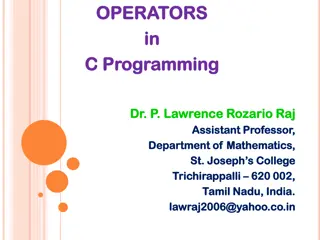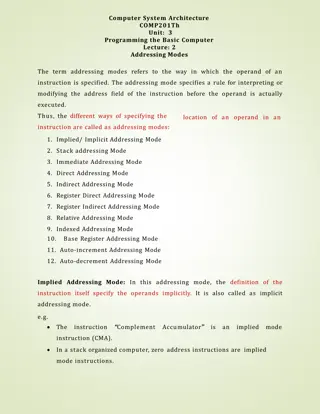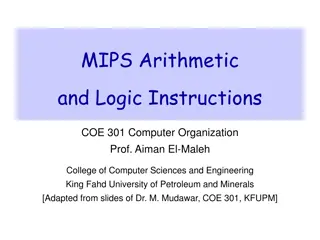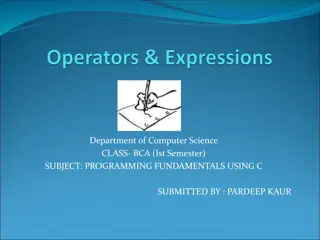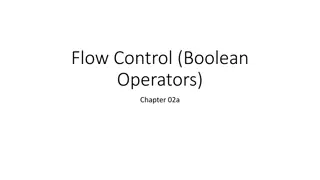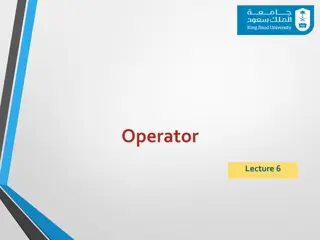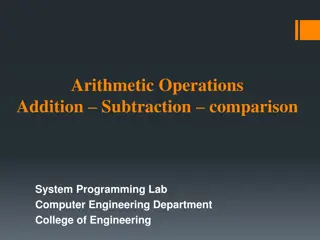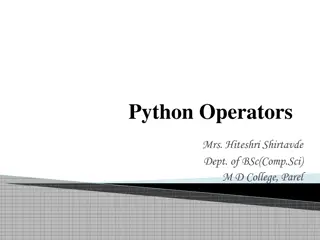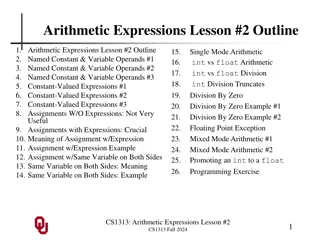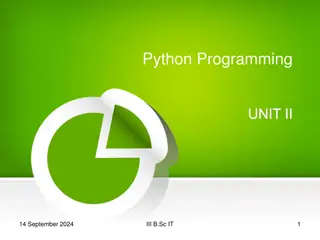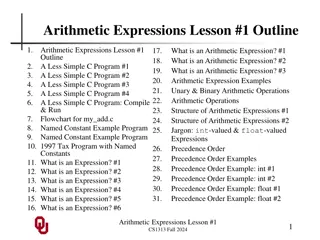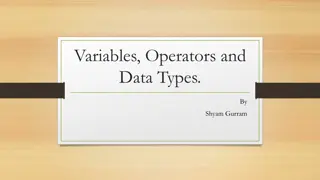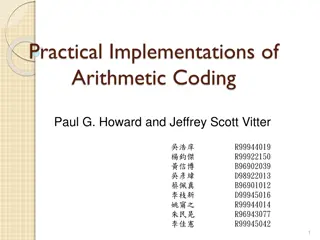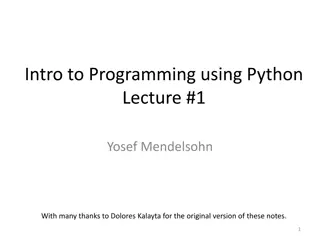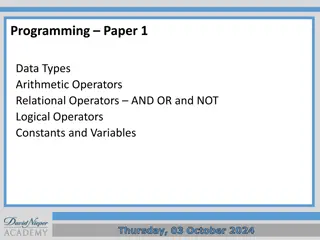Understanding Arithmetic, Increment, and Decrement Operators in C Programming
Explore different types of operators in C programming like arithmetic operators for mathematical operations, increment and decrement operators for changing operand values, assignment operators for assigning values to variables, and relational operators for checking relationships between operands. See examples and meanings of each operator.
Download Presentation

Please find below an Image/Link to download the presentation.
The content on the website is provided AS IS for your information and personal use only. It may not be sold, licensed, or shared on other websites without obtaining consent from the author. Download presentation by click this link. If you encounter any issues during the download, it is possible that the publisher has removed the file from their server.
E N D
Presentation Transcript
Types of Operators Arithmetic Operators Increment and Decrement Operators Assignment Operators Relational Operators Logical Operators Bitwise Operators
Arithmetic Operator An arithmetic operator performs mathematical operations such as addition, subtraction, multiplication, division etc on numerical values (constants and variables). Operator Meaning of Operator + addition or unary plus subtraction or unary minus - * multiplication / division remainder after division (modulo division) %
Example program #include<stdio.h> Void main() { int a=9,b=4,c; c=a+b printf( a+b=%d \n ,c); c=a-b Printf( a-b=%d\n ,c); Getch(); } Output: a+b=13 a-b=5
Increment and Decrement Operators C programming has two operators increment ++ and decrement -- to change the value of an operand (constant or variable) by 1. Increment ++ increases the value by 1 whereas decrement -- decreases the value by 1. These two operators are unary operators, meaning they only operate on a single operand.
Example #include <stdio.h> int main() { int a = 10, b = 100; float c = 10.5, d = 100.5; printf("++a = %d \n", ++a); printf("--b = %d \n", --b); return 0; } OUTPUT: ++a = 11 --b = 99
Assignment Operator An assignment operator is used for assigning a value to a variable. The most common assignment operator is (=) Operator Example Same as = a = b a = b += a += b a = a+b -= a -= b a = a-b *= a *= b a = a*b /= a /= b a = a/b %= a %= b a = a%b
Example #include <stdio.h> int main() { int a = 5, c; c = a; // c is 5 printf("c = %d\n", c); c += a; // c is 10 printf("c = %d\n", c); c -= a; // c is 5 printf("c = %d\n", c); return 0; } OUPUT: c=5 c=10
Relational Operators A relational operator checks the relationship between two operands. If the relation is true, it returns 1; if the relation is false, it returns value 0. Meaning of Operator Operator Example 5 == 3 is evaluated to 0 == Equal to 5 > 3 is evaluated to 1 > Greater than 5 < 3 is evaluated to 0 < Less than 5 != 3 is evaluated to 1 != Not equal to Greater than or equal to 5 >= 3 is evaluated to 1 >=
Example #include <stdio.h> int main() { int a = 5, b = 5, c = 10; printf("%d == %d is %d \n", a, b, a == b); printf("%d == %d is %d \n", a, c, a == c); printf("%d > %d is %d \n", a, b, a > b); printf("%d > %d is %d \n", a, c, a > c); printf("%d < %d is %d \n", a, b, a < b); return 0; } OUTPUT: 5 == 5 is 1 5 == 10 is 0 5 > 5 is 0 5 > 10 is 0
Logical Operators An expression containing logical operator returns either 0 or 1 depending upon whether expression results true or false. Logical operators are commonly used in decision making in C programming. Operator Meaning Example If c = 5 and d = 2 then, expression ((c==5) && (d>5)) equals to 0. Logical AND. True only if all operands are true && If c = 5 and d = 2 then, expression ((c==5) || (d>5)) equals to 1. Logical OR. True only if either one operand is true || Logical NOT. True only if the operand is 0 If c = 5 then, expression !(c==5) equals to 0. !
Example #include <stdio.h> int main() { int a = 5, b = 5, c = 10, result; result = (a == b) && (c > b); printf("(a == b) && (c > b) is %d \n", result); result = (a == b) && (c < b) printf("(a == b) && (c < b) is %d \n", result); result = (a == b) || (c < b); printf("(a == b) || (c < b) is %d \n", result); OUTPUT: (a == b) && (c > b) is 1 (a == b) && (c < b) is 0 (a == b) || (c < b) is 1
Bitwise Operators During computation, mathematical operations like: addition, subtraction, multiplication, division, etc are converted to bit-level which makes processing faster and saves power. Operators Meaning of operators & Bitwise AND | Bitwise OR ^ Bitwise exclusive OR ~ Bitwise complement << Shift left >> Shift right




